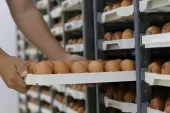Asia Cassava Resources 2010 profit to HK$82.7mn
The company mulls to establish its Vietnam plant to procure local dried cassava chips.
Asia Cassava Resources Holdings Limited (“Asia Cassava Resources”), the largest procurer and exporter of dried cassava chips in Thailand and the largest supplier of imported dried cassava chips to the PRC, announced its audited annual results for the year ended 31 March 2011. During the period under review, the Group recorded revenue of approximately HK$2.02 billion (2010: approximately HK$2.0 billion). Profit attributable to shareholders of the Company was approximately HK$82.71 million (2010: approximately HK$100 million). Basic earnings per share were 21.9 HK cents (2010: 31.1 HK cents).
The Group maintained a strong financial position with a gearing ratio of 16.5%, which showed an improvement from 17.1% in the same period of last year. As at 31 March 2011, cash and cash equivalents were approximately HK$88.2 million (2010: approximately HK$64.0 million). The Board recommended a final dividend of 4 HK cents per share for the year ended 31 March 2011 (2010: 6 HK cents per share). Together with the interim dividend of 2.2 HK cents per share already paid, the total dividend for the year amounted to 6.2 HK cents per share (2010: 8 HK cents per share).
Mr. Chu Ming Chuan, Chairman of Asia Cassava Resources, said, “During the period under review, the Group continued its leading position in the dried cassava chip market and maintained its market share in the PRC and Thailand while demand for dried cassava chips in the PRC remained strong. However, amidst the rising Consumer Price Index in the PRC, the Chinese government controlled the price level of corns. Thus, the Group was not able to set its selling prices with reference to the international cassava chips prices and fully pass on the rise in procurement cost to its customers. Fortunately, as the largest procurer and exporter of dried cassava chips in Thailand, we enjoy an advantage in product pricing, which helps to mitigate the impact of rising costs on the Group’s profit.”
“Moreover, a vessel we purchased with loading up to approximately 47,000 metric tonnes has been in operation since June last year. The vessel has boosted the Group’s transportation capability, enhanced our flexibility in transportation and reduced our reliance on vessels currently leased from an independent third party, thereby reducing our shipment cost and achieving better efficiency of logistics arrangements. The Group has also achieved notable results in cost control during the year.
Selling and distribution expenses were reduced by 28% to HK$158.0 million, which accounted for 7.8% of the Group’s revenue during the period. This represents a decrease of 3.2 percentage points when compared with 11.0% in the same period last year.”
The Group has established a new warehouse in Thailand this year as scheduled and increased the total number of warehouses to six, which further enhanced its ability to procure dried cassava chips, according to an Asia Cassava Resources report.
To date, the total capacity of dried cassava chips at the Group’s warehouses in Thailand and Cambodia was 230,000 tonnes. The Group is also planning to set up a company in Vietnam to procure local dried cassava chips.
Looking ahead, in terms of developing its upstream operations, the Group will continue to set up warehouses and drying yards in the major cassava plantation areas in Thailand, while expanding its procurement network to increase supply of cassava chips. Replicating its successful business model in Thailand, the Group will set up its procurement network and logistics facilities in other Southeast Asian countries such as Cambodia and Laos to capitalise on the huge potential of producing and procuring cassava chips in those regions. Regarding the development of sales network in the PRC, the Group will extend its sales network to Southern and Southwestern China and increase its brand awareness in Eastern and Central China, thus strengthening the Group’s leading position in the cassava market in the PRC.



















 Advertise
Advertise






